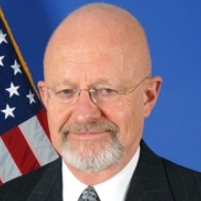Director of National Intelligence: Who is James Clapper?
Monday, August 02, 2010

James R. Clapper, Jr. has extensive experience in intelligence matters, having worked in the field during his four-decade career in the U.S. Air Force and in the administration of President George W. Bush. However, his nomination by President Barack Obama on June 5, 2010, to be Director of National Intelligence was controversial due to Clapper’s aggressive support for outsourcing intelligence work, including prisoner interrogations, to private contractors, and his multiple payroll connections with defense and intelligence contractors. On July 29, the Senate Select Intelligence Committee voted unanimously to approve Clapper's nomination.
As a young man, Clapper first looked to the U.S. Marine Corps for his career, enlisting briefly in its reserves. But he soon decided to transfer to the Air Force Reserve Officer Training Corps program, which he enrolled in while attending the University of Maryland. Clapper was commissioned a second lieutenant in the Air Force upon graduating in 1963 with a Bachelor’s degree in political science.
From March 1964 to December 1965, he served as the analytic branch chief for the Air Force Special Communications Center at Kelly Air Force Base in Texas. Clapper was then a watch officer and air defense analyst for the 2nd Air Division (later, 7th Air Force) stationed at Tan Son Nhut Air Base in South Vietnam. From December 1966 to June 1970, he was back at Kelly AFB as aide to the commander and command briefer for the Air Force Security Service.
In 1970 Clapper earned a Master of Arts in political science from St. Mary’s University in Texas. It was then off to Thailand, where he commanded Detachment 3 of the 6994th Security Squadron stationed at Nakhon Phanom Royal Thai Air Force Base. During his two tours in Southeast Asia, he flew 73 combat support missions over Laos and Cambodia.
In June 1971 Clapper returned to the states to be military assistant to the director of the National Security Agency (NSA), Noel Gayler, at Fort George G. Meade in Maryland. About two years later he became aide to the commander and intelligence staff officer for the Headquarters Air Force Systems Command at Andrews Air Force Base in Maryland.
Clapper spent a year studying at the Armed Forces Staff College in Norfolk, Virginia from August 1974 to September 1975. Then it was on to Hawaii to serve as chief of the signal intelligence branch at U.S. Pacific Command headquarters at Camp H.M. Smith.
He spent another year studying from August 1978 to June 1979, but this time at the National War College at Fort Lesley J. McNair in Washington, DC.
He then returned to Fort Meade to be the Washington area representative for electronic security command. Clapper’s next assignment at Fort Meade was serving as commander of the 6940th Electronic Security Wing, before returning to Washington as the director for intelligence plans and systems in the Office of the Assistant Chief of Staff for Intelligence located at Air Force headquarters.
From June 1984 to May 1985, he was commander of the Air Force Technical Applications Center at Patrick Air Force Base, Florida.
In time, Clapper served as director of intelligence for three unified commands: U.S. Forces Korea (1985-1987), U.S. Pacific Command (1987-1989) and Strategic Air Command (1989-1990). Also, he served as senior intelligence officer for the Air Force, before taking on his final military post as director of the Defense Intelligence Agency (DIA) from 1992-1995.
After retiring from the service in 1995 as a lieutenant general, he worked as executive director of military intelligence programs for defense contractor Booz Allen Hamilton. In 1998 he moved on to Intelligence Programs director for SRA International, another government contractor.
On September 13, 2001, he joined the Bush administration as director of the National Geospatial-Intelligence Agency (NGA), which was then known as the National Imagery and Mapping Agency. He held this position until June 2006. During his tenure, he privatized much of the NGA’s imagery gathering, relying heavily on two companies, DigitalGlobe and GeoEye. Five months after leaving the NGA, Clapper joined the board of directors of GeoEye, where he stayed for five more months…long enough to see GeoEye gain an extra $29.9 million in contracts from the NGA.
In October 2006 Clapper was hired as chief operating officer for DFI Government Services, a national security consulting firm. DFI was soon acquired by Detica which was, in turn, bought out by BAE Systems. Also in October 2006, Clapper joined the board of directors of 3001 International, a prime contractor of the NGA that was acquired by Northup Grumman in September 2008.
Clapper resigned these positions in April 2007, when President George W. Bush nominated him to become under secretary of defense for intelligence. In this role he oversaw the DIA, NGA, the NSA and the National Reconnaissance Office, while working closely with the director of national intelligence. He also held the title of director of defense intelligence, reporting directly to the director of national intelligence as his principal advisor regarding defense intelligence matters. In 2007, Clapper told a Senate committee that he supported the use of private contractors to interrogate detainees.
-Noel Brinkerhoff, David Wallechinsky
Lieutenant General James R. Clapper Jr. (U.S. Air Force)
National Intelligence Nominee Oversaw Problematic Contract (by Ken Dilanian Los Angeles Times)
Clapper: Managing the Intelligence Enterprise (by Tim Shorrock, Foreign Policy in Focus)
James Clapper Profile (National Corruption Index.org)
- Top Stories
- Unusual News
- Where is the Money Going?
- Controversies
- U.S. and the World
- Appointments and Resignations
- Latest News
- Musk and Trump Fire Members of Congress
- Trump Calls for Violent Street Demonstrations Against Himself
- Trump Changes Name of Republican Party
- The 2024 Election By the Numbers
- Bashar al-Assad—The Fall of a Rabid AntiSemite






Comments